Current Graduate Students
Sarah Ramirez (MS)
“Home Range Size and Habitat Use of Ferruginous Hawks in Western Wyoming”
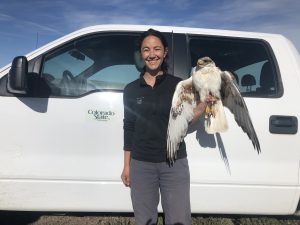 I am a Master’s student in the Department of Fish, Wildlife, and Conservation Biology. My research interests include wildlife-human conflicts, investigating understudied species, and collaborative conservation. My graduate research is investigating nesting selection and habitat use of the Ferruginous Hawk before large-scale energy development, with the ultimate goal of developing mitigation measures to combat the detrimental effects development has on this species during the breeding season.
I am a Master’s student in the Department of Fish, Wildlife, and Conservation Biology. My research interests include wildlife-human conflicts, investigating understudied species, and collaborative conservation. My graduate research is investigating nesting selection and habitat use of the Ferruginous Hawk before large-scale energy development, with the ultimate goal of developing mitigation measures to combat the detrimental effects development has on this species during the breeding season.
Moe Uili (MS)
“Using acoustic surveys to evaluate the abundance and distribution of manumea, a critically endangered Samoan pigeon”
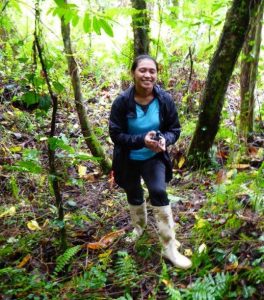
I am a Fulbright MS student in the Department of Fish, Wildlife and Conservation Biology. I hail from Samoa, a small island in the heart of Polynesia. My graduate research is focused on assessing the abundance, distribution and breeding success of the critically endangered Tooth-billed Pigeon or Manumea, a critically endangered bird endemic to the Samoan islands. I aim to closely engage local communities in every aspect of the work to strengthen long term stakeholder support, maintain community sense of ownership of local natural resources management and promote the recognition of science and traditional knowledge in decision making for threatened and endangered species and ecosystem protection. The knowledge and skills gained as an outcome of this work will be used to help establish a long term monitoring protocol for Tooth-billed Pigeon conservation.
Carolyn Coyle (Ph.D.)
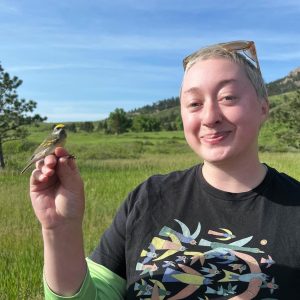 I am an NSF Graduate Research Fellow and PhD student in the department of Fish, Wildlife and Conservation Biology and the Graduate Degree Program in Ecology. My interests include avian conservation, ecosystem services, and community outreach through participatory science initiatives (e.g iNaturalist). My graduate research focuses on the role that migratory passerines may play in maintaining plant diversity through pollination both in their western breeding grounds and along the western migratory flyway. Through my PhD, I will collaborate with a network of bird banding stations and use DNA pollen metabarcoding to identify what plant genera are associated with pollen collected from songbirds & hummingbirds. By working towards the formative documentation of passerine pollination networks in North America, I seek to uncover the role of songbirds in pollination systems and to inform conservation efforts in this era of widespread pollinator declines.
I am an NSF Graduate Research Fellow and PhD student in the department of Fish, Wildlife and Conservation Biology and the Graduate Degree Program in Ecology. My interests include avian conservation, ecosystem services, and community outreach through participatory science initiatives (e.g iNaturalist). My graduate research focuses on the role that migratory passerines may play in maintaining plant diversity through pollination both in their western breeding grounds and along the western migratory flyway. Through my PhD, I will collaborate with a network of bird banding stations and use DNA pollen metabarcoding to identify what plant genera are associated with pollen collected from songbirds & hummingbirds. By working towards the formative documentation of passerine pollination networks in North America, I seek to uncover the role of songbirds in pollination systems and to inform conservation efforts in this era of widespread pollinator declines.
Cozette Romero (M.S.)
“Effects of introduced rats on island forest birds: demography, health and trophic cascades”
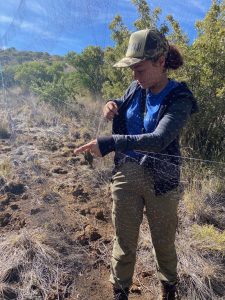 I am a master’s student in the Graduate Degree Program in Ecology. I am interested in investigating responses of avian populations in response to various management methods, increasing efficacy of restoration efforts, and advancing science to inform conservation policy and practice. I have a strong interest in Hawaiian ecosystems and avifauna and my graduate research will be focused around assessing the impact of invasive rat control on the demography and conservation of native forest birds on Kauaʻi island, Hawaiʻi. While doing so, I aim to promote and sustain both the natural and cultural heritage of the islands.
I am a master’s student in the Graduate Degree Program in Ecology. I am interested in investigating responses of avian populations in response to various management methods, increasing efficacy of restoration efforts, and advancing science to inform conservation policy and practice. I have a strong interest in Hawaiian ecosystems and avifauna and my graduate research will be focused around assessing the impact of invasive rat control on the demography and conservation of native forest birds on Kauaʻi island, Hawaiʻi. While doing so, I aim to promote and sustain both the natural and cultural heritage of the islands.
Kathleen Urchek (M.S.)
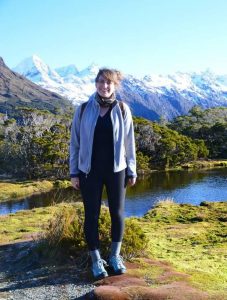 I am a Master’s student in the Department of Fish, Wildlife and Conservation Biology. My interests broadly include conservation ecology, human-wildlife conflicts, and threatened and endangered species research. My graduate research will focus on behavior and movement patterns of sandhill cranes and whooping cranes in airfields, and examine how a non-lethal chemical repellent may alter crane ecology in these habitats. With this research I hope to contribute to the reduction of human-wildlife conflicts and enhance overall management strategies for birds in airport spaces.
I am a Master’s student in the Department of Fish, Wildlife and Conservation Biology. My interests broadly include conservation ecology, human-wildlife conflicts, and threatened and endangered species research. My graduate research will focus on behavior and movement patterns of sandhill cranes and whooping cranes in airfields, and examine how a non-lethal chemical repellent may alter crane ecology in these habitats. With this research I hope to contribute to the reduction of human-wildlife conflicts and enhance overall management strategies for birds in airport spaces.
Miranda Middleton (M.S.)
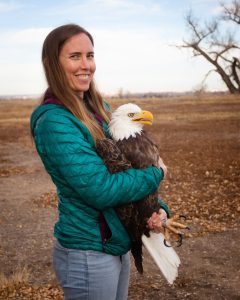 I am a master’s student in the Graduate Degree Program in Ecology. I am interested in studying human-wildlife conflict especially regarding the avian community. My project will involve working with Colorado Parks and Wildlife and Bird Conservancy of the Rockies to study the effects of human development and activity along Colorado’s northern Front Range on the Bald Eagle. I hope to use this research to aid in developing management plans as well as connecting the community to their local wildlife.
I am a master’s student in the Graduate Degree Program in Ecology. I am interested in studying human-wildlife conflict especially regarding the avian community. My project will involve working with Colorado Parks and Wildlife and Bird Conservancy of the Rockies to study the effects of human development and activity along Colorado’s northern Front Range on the Bald Eagle. I hope to use this research to aid in developing management plans as well as connecting the community to their local wildlife.
Teia Schweizer (M.S.)
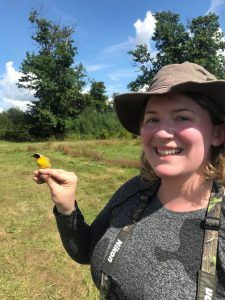 I am a Master’s student in the Graduate Degree Program in Ecology. My research interests include evolutionary ecology, conservation genomics, environmental DNA, restoration ecology, island ecology, human-wildlife interactions, mental illness activism, and animal welfare. As a field technician in Hawai’i, I fell in love with conservation while researching and restoring habitat for the critically endangered bird, the Kiwikiu, on Maui island. Over 250,000 native plant species have been planted in a natural area reserve called Nakula in an effort to support native bird populations, in particular the Kiwikiu. My thesis will assess how habitat restoration impacts distribution and occupancy of native and non-native avian communities. I hope my work will inform future restoration efforts and the likelihood that these efforts can support species in dire need.
I am a Master’s student in the Graduate Degree Program in Ecology. My research interests include evolutionary ecology, conservation genomics, environmental DNA, restoration ecology, island ecology, human-wildlife interactions, mental illness activism, and animal welfare. As a field technician in Hawai’i, I fell in love with conservation while researching and restoring habitat for the critically endangered bird, the Kiwikiu, on Maui island. Over 250,000 native plant species have been planted in a natural area reserve called Nakula in an effort to support native bird populations, in particular the Kiwikiu. My thesis will assess how habitat restoration impacts distribution and occupancy of native and non-native avian communities. I hope my work will inform future restoration efforts and the likelihood that these efforts can support species in dire need.
Alexandra Badeaux (M.S.)
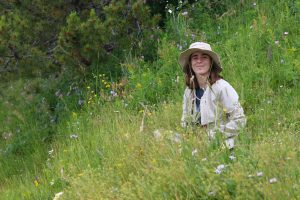 I am an NSF Graduate Research Fellow and PhD student in the Graduate Degree Program in Ecology. My research interests are currently focused on topics related to human disturbance and their effects on bird communities. I am passionate about increasing accessibility within STEM and I aim to use my research as a platform to promote scientific engagement and education within the communities I work with.
I am an NSF Graduate Research Fellow and PhD student in the Graduate Degree Program in Ecology. My research interests are currently focused on topics related to human disturbance and their effects on bird communities. I am passionate about increasing accessibility within STEM and I aim to use my research as a platform to promote scientific engagement and education within the communities I work with.
Libby Mojica (Ph.D.)
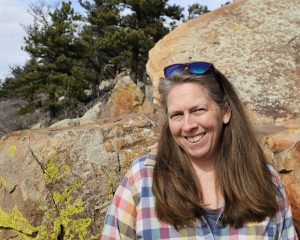 I am a doctoral student in the Graduate Degree Program in Ecology and Department of Fish, Wildlife and Conservation Biology. My interests are in spatial ecology, ornithology (especially raptors!), wildlife management, and wildlife policy. My dissertation will use a collaborative conservation planning approach to understand range-wide patterns of movement and demographic parameters of the Ferruginous Hawk. I plan to use my research to provide reliable science-based decision-support tools that can be integrated across the species range for conservation and management of the species.
I am a doctoral student in the Graduate Degree Program in Ecology and Department of Fish, Wildlife and Conservation Biology. My interests are in spatial ecology, ornithology (especially raptors!), wildlife management, and wildlife policy. My dissertation will use a collaborative conservation planning approach to understand range-wide patterns of movement and demographic parameters of the Ferruginous Hawk. I plan to use my research to provide reliable science-based decision-support tools that can be integrated across the species range for conservation and management of the species.
